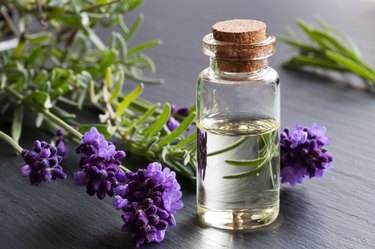
The lavender plant, a fragrant flower, is also an edible herb. You can use lavender to add flavor to baked goods and other recipes. However. the strong flavor can be overpowering, so add it sparingly. There are many health benefits of eating lavender, including upping your intake of vitamins and minerals and protecting your body from antioxidants and stress.
Tip
Lavender health benefits include increasing your intake of certain vitamins and alleviating stress and insomnia, but be aware of any possible drug interactions.
Video of the Day
Minimal Calories and Fat
Including lavender in your meal plan gives you access to a low-calorie, low-fat food with a floral scent. A 100 g serving of lavender introduces 49 calories into your diet as well as 1 g of fat. Lavender is typically not consumed alone, so factor these calories into the foods to which you add lavender. The fat in lavender is negligible in your meal plan — the maximum recommended intake of this macronutrient is 44 to 78 g per day if you follow a 2,000 calorie meal.
Video of the Day
Vitamin A for Eye Health
A serving of lavender provides you with 287 IU of vitamin A, which is only a small portion of the 5,000 IU you need each day. The vitamin A in this floral food is excellent for your eye health. This vitamin helps prevent cataracts and age-related macular degeneration as well as night blindness, dry eyes and eye infections. It also keeps your skin and mucus membranes healthy.
Calcium for Strong Bones
Lavender contains 215 mg of calcium per 100 g portion. As a rule, your diet requires 1,000 mg of this mineral each day, although as you get older you need 1,200 mg or more. The calcium in lavender boosts the strength of your bones, warding off osteoporosis. It may also ease symptoms associated with premenstrual syndrome.
Iron for Healthy Blood
Eat lavender to increase your iron intake. One serving has 2 mg of iron, a considerable portion of the 8 to 11 mg you should consume each day. Iron helps make hemoglobin and myoglobin in your blood. Without adequate quantities of iron in your diet, you may develop anemia, a condition that makes you tired and listless.
Protective and Calming Effects
Lavender contains over 100 known compounds, including phytochemicals and antioxidants. The most well-known of these compounds is limonene, which stimulates digestive enzymes in the liver and may help to detoxify the body of carcinogens. Lavender is also reputed for its calming effects. Whether used in a lavender tea recipe or applied topically as an essential oil or in personal-care products such as bath salts and body lotions, lavender can help to ease stress, anxiety, rheumatism, distension and insomnia.
A Word of Caution
Eating lavender has no known interferences with medications, although you may want to proceed with caution if you take sedatives or medication to treat high blood pressure. Consuming lavender along with sedatives may cause increased drowsiness. Likewise, lavender taken in combination with medication for high blood pressure may cause your blood pressure to drop too low. Check with your doctor before using this flower in cooking if you have concerns about any possible drug interactions.